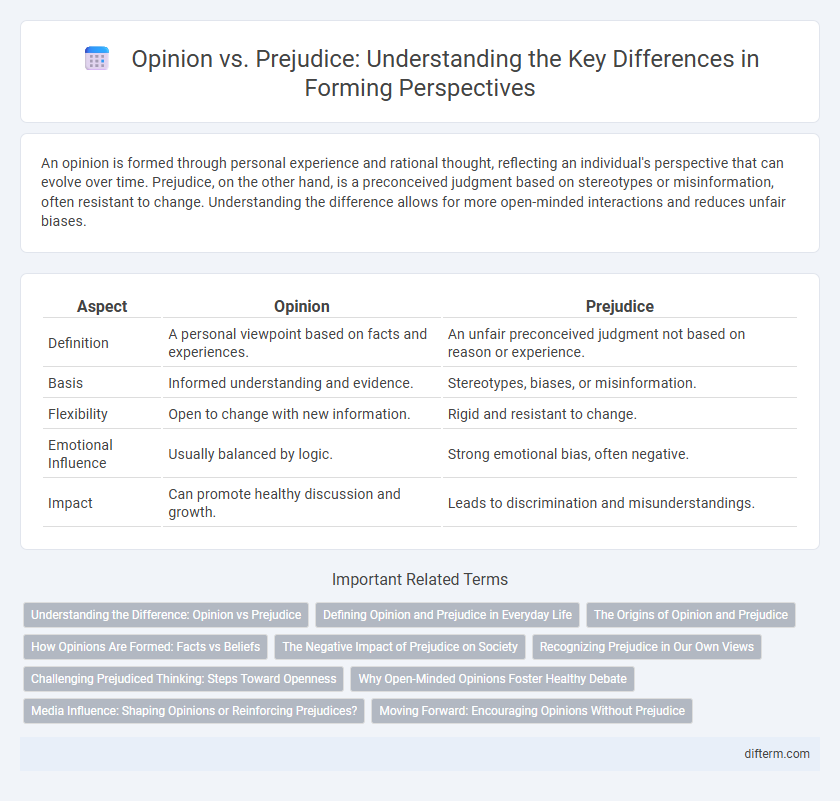An opinion is formed through personal experience and rational thought, reflecting an individual's perspective that can evolve over time. Prejudice, on the other hand, is a preconceived judgment based on stereotypes or misinformation, often resistant to change. Understanding the difference allows for more open-minded interactions and reduces unfair biases.
Table of Comparison
| Aspect | Opinion | Prejudice |
|---|---|---|
| Definition | A personal viewpoint based on facts and experiences. | An unfair preconceived judgment not based on reason or experience. |
| Basis | Informed understanding and evidence. | Stereotypes, biases, or misinformation. |
| Flexibility | Open to change with new information. | Rigid and resistant to change. |
| Emotional Influence | Usually balanced by logic. | Strong emotional bias, often negative. |
| Impact | Can promote healthy discussion and growth. | Leads to discrimination and misunderstandings. |
Understanding the Difference: Opinion vs Prejudice
Opinion represents a reasoned judgment formed through evidence and personal perspective, whereas prejudice involves biased, unfounded assumptions often rooted in stereotypes. Distinguishing the two requires evaluating the basis and openness to change behind each belief. Recognizing this difference fosters critical thinking and promotes more respectful, informed discussions.
Defining Opinion and Prejudice in Everyday Life
Opinion represents a personal belief or judgment formed through evidence and reasoning, while prejudice involves preconceived, often negative, biases lacking rational basis. In everyday life, opinions allow individuals to express diverse perspectives, whereas prejudices hinder understanding and foster discrimination. Recognizing the distinction helps promote open-mindedness and critical thinking.
The Origins of Opinion and Prejudice
Opinions originate from individual experiences, knowledge, and reflective thought, allowing for open-mindedness and adaptability as one acquires new information. Prejudice stems from preconceived notions often rooted in stereotypes, fear, or social conditioning, leading to rigid judgments and resistance to evidence. Understanding the distinct origins helps to foster critical thinking and reduce unwarranted biases in social interactions.
How Opinions Are Formed: Facts vs Beliefs
Opinions are formed through a careful evaluation of facts, evidence, and personal experiences, allowing individuals to develop reasoned conclusions. Prejudice, on the other hand, often stems from ingrained beliefs, stereotypes, or misinformation that bypass critical analysis. Understanding the distinction between fact-based opinions and belief-driven prejudices is essential for fostering open-mindedness and informed decision-making.
The Negative Impact of Prejudice on Society
Prejudice distorts social interactions by fostering stereotypes and discrimination, which undermine social cohesion and trust. Unlike opinion, which can be informed and open to change, prejudice is often rigid and emotionally driven, leading to social division and systemic inequality. The persistence of prejudice hampers efforts toward equality and mutual understanding, perpetuating injustice and social unrest.
Recognizing Prejudice in Our Own Views
Recognizing prejudice in our own views requires honest self-reflection and awareness of implicit biases that influence perception. Distinguishing opinion, which is based on reasoned judgment, from prejudice, rooted in unfounded assumptions, helps cultivate open-mindedness. Embracing diversity of thought fosters critical thinking and reduces the impact of stereotypes in personal beliefs.
Challenging Prejudiced Thinking: Steps Toward Openness
Challenging prejudiced thinking requires recognizing inherent biases and actively seeking diverse perspectives to foster intellectual openness. Engaging in reflective dialogue and exposing oneself to unfamiliar cultures or ideas can dismantle stereotypes and promote empathy. This deliberate effort transforms fixed judgments into informed opinions, creating a foundation for more inclusive and equitable interactions.
Why Open-Minded Opinions Foster Healthy Debate
Open-minded opinions encourage the free exchange of diverse perspectives, which fosters critical thinking and mutual understanding in debates. Unlike prejudice, which is based on unfounded biases and rigid beliefs, open-mindedness allows individuals to evaluate evidence objectively and adapt their views. This flexibility promotes respectful dialogue, reduces conflict, and leads to more informed and constructive outcomes.
Media Influence: Shaping Opinions or Reinforcing Prejudices?
Media plays a critical role in shaping public opinion by selectively presenting information and framing narratives that influence perception. However, biased or sensationalized content often reinforces existing prejudices by amplifying stereotypes and polarizing viewpoints. Understanding the distinction between opinion formation and prejudice solidification in media consumption is essential for promoting informed and unbiased perspectives.
Moving Forward: Encouraging Opinions Without Prejudice
Encouraging opinions without prejudice fosters open, respectful dialogue essential for societal progress. Distinguishing constructive opinions from biased prejudices involves critical thinking and empathy, allowing individuals to challenge assumptions and broaden perspectives. Cultivating environments where diverse viewpoints are valued reduces conflict and promotes collaborative problem-solving.
opinion vs prejudice Infographic

 difterm.com
difterm.com